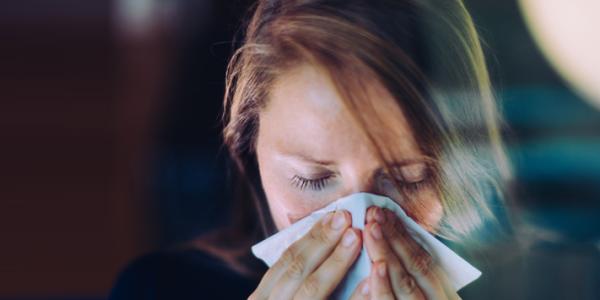
Seasonal allergies that are triggered by tree, grass and weed pollen affect more than 50 million Americans every year.
For most people, spring and early summer are when they are likely to be bothered by allergy symptoms. During normal years, allergies are shrugged off as minor annoyances that can usually be managed with over-the-counter medications. But this year, with the threat of coronavirus still a top concern, some symptoms of allergies may be confused with COVID-19. To help you understand what is probably an allergy versus something more serious, this comparison of symptoms may help:
Skip
Seasonal Allergy Symptoms:
- Sneezing
- Runny nose
- Nasal congestion
- Minor cough
- Itchy or watery eyes
- Lack of energy
- Congestion
- Facial pain
- Postnasal drip
Learn more about seasonal allergies.
COVID-19 Symptoms (as recognized by the CDC):
- Fever
- Shortness of breath or difficulty breathing
- Cough
- Chills
- Muscle pain
- Extreme fatigue
- Headache
- Sore throat
- Loss of taste or smell
While many of the symptoms differ, there are some symptoms that are associated with both allergies and coronavirus. However, while symptoms may be similar, there are important differences in the severity of the symptoms and how they present in the body.
Similar Symptoms, but Important Differences
- Eye problems. Pink eye is a possible symptom of COVID-19, and results in red and burning eyes. The itchy and watery eyes caused by allergies is usually mild and bothersome — but not painful.
- Lack of energy and fatigue. While some people may feel run down or lack energy during an acute seasonal allergy attack, they are normally able to continue with their everyday activities. Extreme fatigue, to the point where it’s difficult to get out of bed or take care of basic needs, is much more serious and associated with COVID-19.
- Cough. Some people experience a mild cough along with congestion, runny nose or sneezing when suffering from allergies. If the cough responds to allergy medications, it’s almost certainly nothing to worry about. However, a cough that’s accompanied with a fever or shortness of breath could be a symptom of COVID-19.
- Loss of taste or smell. Seasonal allergies can sometimes affect your sense of taste or smell, but it’s usually mild or comes and goes along with other symptoms. A sudden and complete loss of taste or smell, especially without accompanying congestion, sneezing, or runny nose, is a recently recognized symptom of COVID-19.
If you have been affected by seasonal allergies in the past, and your symptoms are similar to what you’ve experienced before, chances are that’s what you’re dealing with now. And, if your symptoms respond to over-the-counter remedies or medication prescribed for allergies, you can be fairly certain you don’t have COVID-19.
On the other hand, if you have new or unusual symptoms, especially a fever, shortness of breath or a cough that lingers or worsens, talk to your doctor immediately to see if you should be tested for coronavirus.
This article first appeared in the May 2020 edition of the HealthPerks newsletter.

